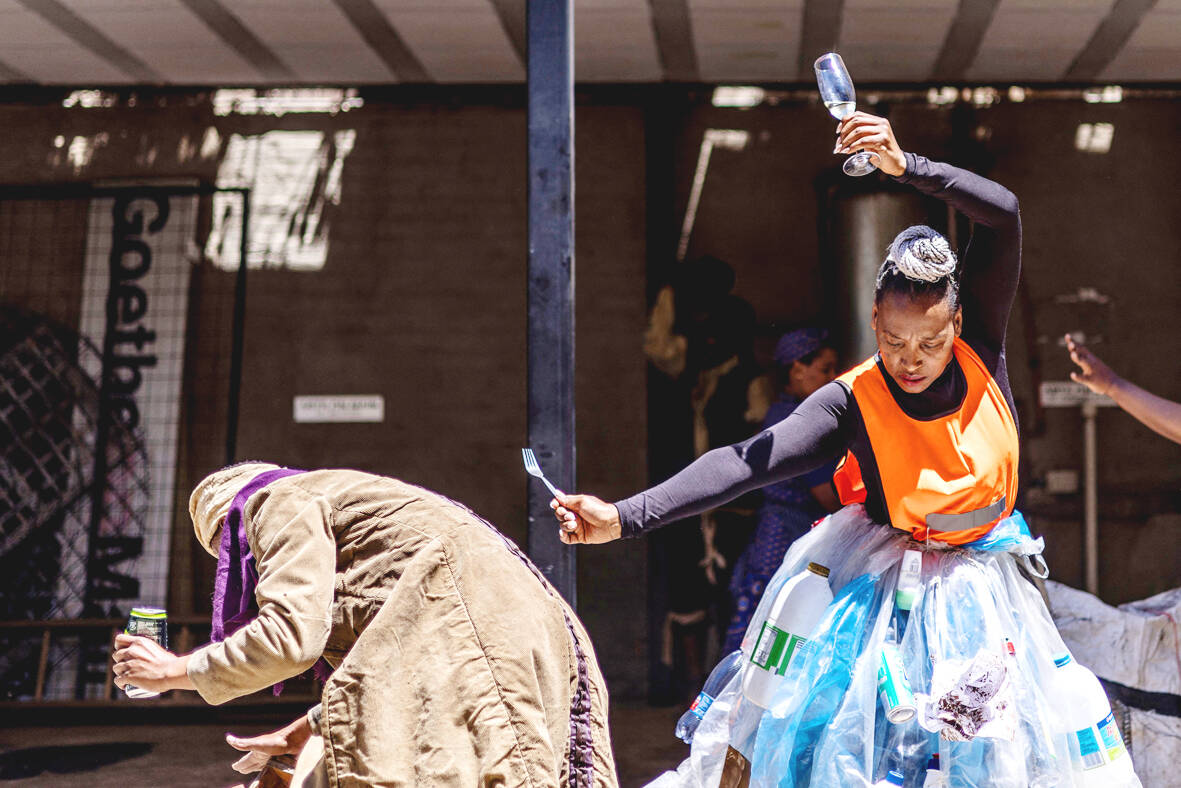At first glance it looks like an ordinary street parade, with marching minstrels, baton-twirling majorettes, painted faces and glittering costumes careering down a battered, rundown Johannesburg street.
A small boy in a torn T-shirt takes in the sunny scene, eyes wide open and fists on his hips. He was one of several children following the parade, unsupervised and fascinated by the festivities in the gritty neighborhood.
But unlike the traditional minstrel parades in South Africa, this procession was joined by some of the poorest of the poor — the “recyclers” who rummage through garbage in hopes of finding something that will earn a few pennies.

Photo: AFP
The display, titled “No Man’s Land,” was a creation of The Centre for the Less Good Ideas, co-founded by William Kentridge, a South African artist famous for his drawings and animated films.
The bushy-browed 68-year-old is present, wearing his customary white shirt and Panama hat, amusedly observing the hustle and bustle, the whistles and shouts.
It was choreographer and dancer Sello Pesa who came up with the idea of the carnival procession to celebrate the 10th season for the center, whose headquarters are in the Maboneng district — the depressed center of South Africa’s economic capital.
The artists got ready in the courtyard of this former industrial complex, made up of small brick buildings now housing performance halls and workshops.
For the parade, Pesa enlisted the recyclers, who normally focus on searching for items like cardboard, scrap metal and plastics to earn a meager living.
“My idea is to look at ignored societies that feed art, exploring how they can meet in public space. To bring what is thrown away into a pristine, posh area,” the trained dancer said.
“Last time there were Congolese men who work as security guards or parking attendants in the street. This time the recyclers mostly come from Lesotho,” he said. “I meet them on the street, when I park my car. They tell me their stories.”
Suddenly, a fairy appears in a stunning hand-sewn dress, evoking the fluorescent vests worn by garbage collectors, extended by a plastic skirt covered with empty bottles —milk, deodorant, toiletries — and crumpled paper. It’s as if the contents of a garbage can had been poured over her head.
“This is what the planet is going through. It’s hot under my skirt. Like the planet,” the dancer, 39-year-old Teresa Phuti Mojela, says.
She taps a fork on a wine glass, getting everyone’s attention as she signals the start of the fanfare.
The garbage scavengers sing a cappella, clapping their hands, using inflated bags as percussion and boomboxing with their mouths.
Residents, passers-by and other onlookers raise a cheer as the band takes to the streets, marching behind a pickup truck loaded with a loudspeaker.
At the front, a feather-capped minstrel rolls his eyes and grimaces to amuse the children.
He throws his stick in the air, deftly retrieves it and sways to the beat. The scene is reminiscent of a Mardi Gras parade in New Orleans.
A wave of energy and noisy joy threads its way through the poor, ramshackle and often dangerous streets. Several police cars flank the mad procession as it passes small grocery stores and braziers of grilled meat on the sidewalk.
A fleeting look of joy crosses the faces of the crowd, who take a moment’s pause from their everyday lives.

June 2 to June 8 Taiwan’s woodcutters believe that if they see even one speck of red in their cooked rice, no matter how small, an accident is going to happen. Peng Chin-tian (彭錦田) swears that this has proven to be true at every stop during his decades-long career in the logging industry. Along with mining, timber harvesting was once considered the most dangerous profession in Taiwan. Not only were mishaps common during all stages of processing, it was difficult to transport the injured to get medical treatment. Many died during the arduous journey. Peng recounts some of his accidents in

“Why does Taiwan identity decline?”a group of researchers lead by University of Nevada political scientist Austin Wang (王宏恩) asked in a recent paper. After all, it is not difficult to explain the rise in Taiwanese identity after the early 1990s. But no model predicted its decline during the 2016-2018 period, they say. After testing various alternative explanations, Wang et al argue that the fall-off in Taiwanese identity during that period is related to voter hedging based on the performance of the Democratic Progressive Party (DPP). Since the DPP is perceived as the guardian of Taiwan identity, when it performs well,

The Taiwan People’s Party (TPP) on May 18 held a rally in Taichung to mark the anniversary of President William Lai’s (賴清德) inauguration on May 20. The title of the rally could be loosely translated to “May 18 recall fraudulent goods” (518退貨ㄌㄨㄚˋ!). Unlike in English, where the terms are the same, “recall” (退貨) in this context refers to product recalls due to damaged, defective or fraudulent merchandise, not the political recalls (罷免) currently dominating the headlines. I attended the rally to determine if the impression was correct that the TPP under party Chairman Huang Kuo-Chang (黃國昌) had little of a

A short walk beneath the dense Amazon canopy, the forest abruptly opens up. Fallen logs are rotting, the trees grow sparser and the temperature rises in places sunlight hits the ground. This is what 24 years of severe drought looks like in the world’s largest rainforest. But this patch of degraded forest, about the size of a soccer field, is a scientific experiment. Launched in 2000 by Brazilian and British scientists, Esecaflor — short for “Forest Drought Study Project” in Portuguese — set out to simulate a future in which the changing climate could deplete the Amazon of rainfall. It is